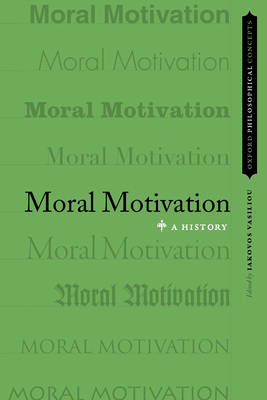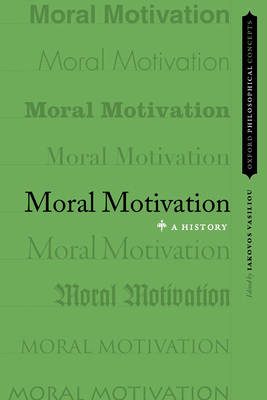
Je cadeautjes zeker op tijd in huis hebben voor de feestdagen? Kom langs in onze winkels en vind het perfecte geschenk!
- Afhalen na 1 uur in een winkel met voorraad
- Gratis thuislevering in België vanaf € 30
- Ruim aanbod met 7 miljoen producten
Je cadeautjes zeker op tijd in huis hebben voor de feestdagen? Kom langs in onze winkels en vind het perfecte geschenk!
- Afhalen na 1 uur in een winkel met voorraad
- Gratis thuislevering in België vanaf € 30
- Ruim aanbod met 7 miljoen producten
Zoeken
Omschrijving
Moral Motivation presents a history of the concept of moral motivation. The book consists of ten chapters by eminent scholars in the history of philosophy, covering Plato, Aristotle, later Peripatetic philosophy, medieval philosophy, Spinoza, Locke, Hume, Kant, Fichte and Hegel, and the consequentialist tradition. In addition, four interdisciplinary "Reflections" discuss how the topic of moral motivation arises in epic poetry, Cicero, early opera, and Theodore Dreiser. Most contemporary philosophical discussions of moral motivation focus on whether and how moral beliefs by themselves motivate an agent (at least to some degree) to act. In much of the history of the concept, especially before Hume, the focus is rather on how to motivate people to act morally as well as on what sort of motivation a person must act from (or what end an agents acts for) in order to be a genuinely ethical person or even to have done a genuinely ethical action. The book shows the complexity of the historical treatment of moral motivation and, moreover, how intertwined moral motivation is with central aspects of ethical theory.
Specificaties
Betrokkenen
- Uitgeverij:
Inhoud
- Aantal bladzijden:
- 322
- Taal:
- Engels
- Reeks:
Eigenschappen
- Productcode (EAN):
- 9780199316571
- Verschijningsdatum:
- 17/06/2016
- Uitvoering:
- Paperback
- Formaat:
- Trade paperback (VS)
- Afmetingen:
- 137 mm x 208 mm
- Gewicht:
- 340 g

Alleen bij Standaard Boekhandel
+ 190 punten op je klantenkaart van Standaard Boekhandel
Beoordelingen
We publiceren alleen reviews die voldoen aan de voorwaarden voor reviews. Bekijk onze voorwaarden voor reviews.








